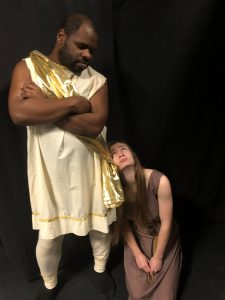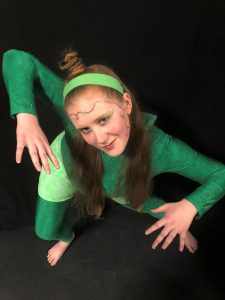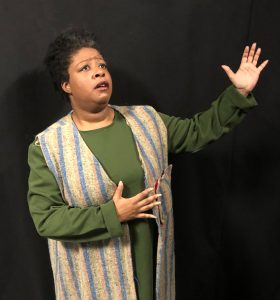Pavlina Morris takes us on an adapted Shakespearian journey of whimsical romance and rivalry in The Changing Scene’s production of A Midsummer Night’s Dream. In Shakespeare’s time we would have seen an all male cast, as women were not allowed on stage in 1595. As a result The Changing Scene’s decision to gender bend several roles is all the more enjoyable, and provides so much for the eclectic cast to work with. Everything about the intimate space of Dukesbay Theater complimented the elegant performance. This deep breath of fresh air is a much needed escape from Fall’s frigid arrival.
The pleasant set and costumes indicate that we have indeed entered the realm of Greek Mythology. Theseus, the Duke of Athens, is to wed the captured Amazonian Queen, Hippolyta. They decide that Hermia, daughter of Egeus (not represented), must marry Demetrius, though she desperately loves Lysandra (Originally Lysander). Helena, a childhood friend of Hermia’s, is scorned by Hermia’s beauty and Demetrius’ desire for it. Elsewhere, the King and Queen of the Fairies, Oberon and Titania, quibble over the Queen’s rescued page boy. The King is in a scheming mood as he and his servant, Puck plot to steal the boy away, while interfering with mortal affairs. JUst to add a little spice, Petra Quince and her masters prepare a play for the Duke.
Strutting on stage to start the first scene comes Nick Fitzgerald as Theseus. After 11 shows with The Changing Scene, Nick is confident in his role as the cocksure Duke of Athens. Theseus takes for granted his captured bride to be, Hippolyta – Queen of the Amazonians. Furthermore, he presumes to speak for whom Hermia is to love and marry, or else! Mr. Fitzgerald follows the tongue twisting hills of prose with poise and a kind of tepid charm. Despite the sternness of his character, he brings the full spirit of whimsy immediately into light, and keeps it there.
The audience doe not see much of this character throughout the play, but she makes it clear there is a hidden depth to this clever queen. Marsha later cradles a greater portion of the story in her role as Titania, the Queen of the Fairies. Here we see her more seductive side, as Titania is bewitched by her husband, King Oberon, falling madly for an unsuspecting suitor.
The aforementioned Hermia, daughter of Egeus, is portrayed by the exceptional Corissa DeVerse. It’s no easy task speaking paragraphs of Shakespearian text. Ms. DeVerse suspends each line from a thread of raw emotion, as she should; Hermia being sentenced to either an unwanted marriage, lifelong seclusion in a nunnery, or death. It feels as though Corissa is performing directly from the pages of her own diary as she rejects Demetrius’s bullish pursuit over Lysandra’s gentle adoration.
Two actors new to The Changing Scene join the seasoned talent on stage. The captivating Emily Saletan, performing Lysandra, and Ton Williams, portraying Demetrius. Ms. Saletan brought a playful energy and deep sincerity to this traditionally male role. She shows us how Lysandra’s fire can inspire hope in us all through her honest pursuit of Hermia’s hand. In rivalry for the same hand, Mr. Williams’ passionate Demetrius brings a unique zest to the emotions present at play.
Where Hermia sees a repugnant excuse for a human, Helena paints Demetrius in a stunning light, consumed by desire for his love. Surely you can begin to see Shakespeare’s classic lovers quarrels unfolding, but things take an interesting turn as King Oberon and his minion, Puck, meddle in these affairs with magic and malice.
Mckenna Johnson’s staging of the dejected Helena is demanding and yet delicate. Her expressive face and body language could be understood from across a field. Sitting mere feet away we are able to appreciate every nuanced detail of Mckenna’s powerful performance. I will be sure to keep a look out for future works involving the rising star that is Ms. Johnson.
As the lovers get lost in the enchanted woods, the ever mischievous Puck appears. Jill Heinecke portrays Puck with a seductive spark and mysterious air about her. She’s a firecracker of energy, dancing through her verses. Puck is a character that is rarely done well, but Ms. Heinecke made us believe we truly were in the presence of a quick-witted sprite.
A kind of inception begins when a play within the play is revealed. A troupe of players are preparing a piece for the Duke: Petra Quince, Nicole Bottom, Francis Flute, and Tammy Snout. Pavlina Morris portrays Petra Quince and is right at home in her role. It is no question she knows to carry herself with grace, and how to tame the egos of her masters. An overly-confident and humorous Bottom, played by the electric Laurice Roberts, brought energy and kept the audience engaged with every word she spoke. Just as Bottom wishes to grab the Dukes attention with her wit and ability to perform, Ms. Roberts did just that with the audience.
Rounding out the troupe is Francis Flute and Tammy Snout. Mason Quinn plays Flute with precise comedic timing. Even with a prop mishap, he was professional and kept the audience in a state of laughter and delight. Alongside the hilarious Mr. Quinn is Karen Noyes as Snout. This usually stern character was brought to life by Karen’s sassy energy and dry-humor. From facial expressions to her stance, Ms. Noyes is comedy and sincerity wrapped up in a wall of stone.
A Midsummer Night’s Dream was nothing short of magical. A few times, however, I missed the point being made, as the practiced tongues so quickly rattled off what some consider a foreign language. Everyone annunciated and was audible, but it felt like the lines needed more breath to them. Otherwise, I do believe William Shakespeare would have been proud of Pavlina’s adaptation and the performance from this talented group of actors.
A Midsummer Night’s Dream. The Changing Scene Northwest. Dukesbay Theater. Merlino Arts Center. 508 6th Ave. #10,
Tacoma, WA 98402 Dec13,14, 20, 21 @ 7:30pm Dec 15 @ 2:00pm
Tickets: http://www.changingscenenorthwest.org”>www.changingscenenorthwest.org





















